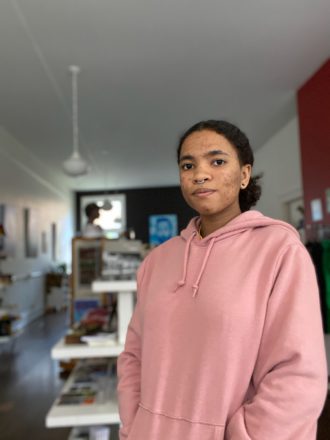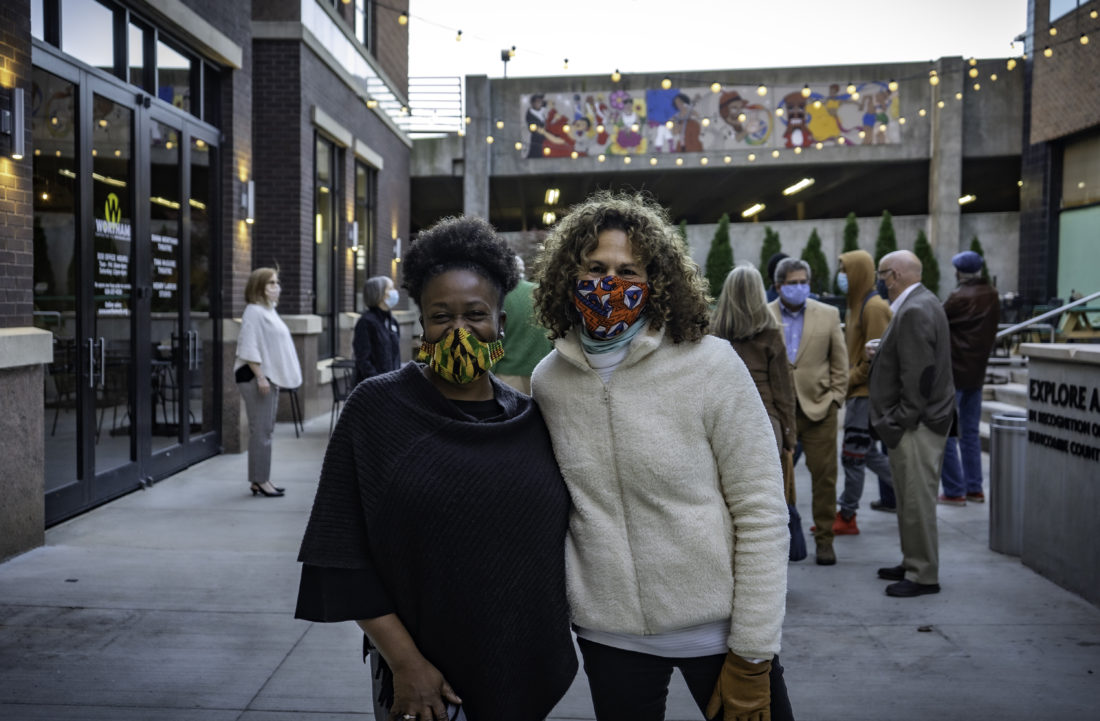The outrage sparked by the murder of George Floyd in May 2020, the ensuing unity of the Black Lives Matter protests and the gradual slacking of public interest in racial justice over the past year felt familiar to Micah Mackenzie.
The Asheville-based artist and a Black, self-professed “country boy at heart from South Carolina” witnessed a similar rush of national harmony in the wake of the Sept. 11, 2001, terrorist attacks. But as the weeks passed, he sensed that his time of being viewed as a fellow American by many of his white brethren was short-lived, and his hope subsided.
“They’ll boost [unity] when it’s trending. But after that, it’s the same old America: ‘What can I do for me and mine, and how can I take this money to the grave?’” Mackenzie says. “It is the greatest country in the world, and it is the worst country in the world.”
In the year since fervent calls for racial equity dominated the national news cycle, Mackenzie and other local artists and arts leaders have again seen a wavering commitment from white allies in Asheville and across the country. Ajax Ravenel, founder of the boutique shop and art gallery Noir Collective, which exclusively showcases the work of Black makers and entrepreneurs, agrees with Mackenzie in that the global flurry of interest in racial justice was and remains primarily “a fad and a photo op.”
But at the same time, Ravenel is seeing a rise in people within Buncombe County who are genuinely committed to making lasting change and “actually putting in the work that it takes to move forward.”
“Where we’re at right now is a really interesting place. There’s a cross between a whole lot of ignorance having to go out the door and a whole lot of working together and creating space for all these beautiful things that we’re doing,” Ravenel says. “I’ve been part of a lot of those conversations where [white allies] were like, ‘OK, how do we support you as Black artists? What do we do to help promote you all and give you space?’ And then they literally gave us space.”
Whether such efforts take root and become the norm depends on a range of factors. But as Mackenzie notes, the city currently seems more focused on promoting the return of tourism than addressing racial inequality, which has him, Ravenel and their fellow Black creators skeptical of Asheville’s dedication to enacting lasting change.
Finally seen
Though Jenny Pickens wonders if the spotlight on local Black artists is temporary, she’s thankful for the attention it’s brought her. The Asheville native has been making art in her hometown since childhood, but it wasn’t until her work last summer as one of the three lead artists on the Black Lives Matter mural in Pack Square that she began getting noticed (see “A Behind-the-scenes Look at Asheville’s Black Lives Matter Mural,” Xpress, Aug. 12, 2020). While Pickens struggles with the fact that it took the well-publicized, consecutive deaths of Ahmaud Arbery, Breonna Taylor and Floyd for her to finally receive significant opportunities, she’s nevertheless embracing the consideration and using it to maximum effect.
“This has given me a platform to help other artists who are like me,” says Pickens. “It also shows them, ‘I don’t have to leave here to go be successful. I can stay here in my hometown, and there’s something for me here.’”
Following her work on Pack Square, Pickens was commissioned to paint a mural for the Wortham Center for the Performing Arts’ new courtyard and selected by Pink Dog Creative owners Hedy Fischer and Randy Shull to be the inaugural Artist in Residency at their 22 London Studio, where she worked on the mural. And though she continues to create, Pickens is focusing much of her efforts on education. In July, when she instructs young women how to quilt and sew, Pickens says she’ll become the first person to teach in the Mars Hill Anderson Rosenwald School building since 1965.
“Growing up, my art teacher was the first one that recognized me,” Pickens says. “You’ve always got to have a safe place to go and a person that can lead you in the right direction. We all need that. So, I feel like I have to give back by doing the same thing.”
Better gatekeeping
Racial justice has long been important to Fischer, particularly when it comes to her Asheville neighbors. She moved to Western North Carolina in 1978 and worked in public health, eventually joining the board of the YWCA of Asheville, which has a storied history of combating racism. But the events of summer 2020 nevertheless made their mark.

“I think most of us have always thought that we’re not bigoted, but I think our awareness has been heightened about the duration of inequality in this country [and how] it’s been going on in various ways for 400 years,” says Fischer, who is white. “I feel like I was a fairly conscious person to begin with, but it’s certainly been heightened around these issues.”
As a result of this wake-up call, she and Shull curated the Pink Dog group show, “In Solidarity,” last July. The exhibition, which ended in May, featured 17 artists who contributed works related to the show’s theme of unity. A percentage of all sales, which Pink Dog matched, benefited local nonprofit BeLoved Asheville, as well as the national efforts of the Equal Justice Initiative and Black Lives Matter. In total, over $12,000 was raised.
In its place is “Women of Distinction” by local Black artist Joseph Pearson, who has a studio at Pink Dog. According to Fischer, the collection of portraits features women who Pearson feels “had been good role models for young women and girls in their communities.” The new show will remain up until Monday, July 5.
“It’s about opportunity, and because white people are the gatekeepers for the most part, I think we have to give people an opportunity to be seen and to thrive and to be heard,” Fischer says.
Systemic change
Katie Cornell, executive director of the Asheville Area Arts Council, says her organization is also committed to racial justice, with initiatives that predate last summer’s marches.
“AAAC has also been working over the last few years to ensure that our grant programs are accessible, adding the Arts Build Community grant in 2018 to support more arts-based projects in underserved communities,” says Cornell, who is white.
She notes that equity and inclusion are top priorities for the AAAC, as exemplified by the 2019 Creative Sector Summit, “Arts in Full Color,” which focused on amplifying non-white artists within the local creative community.
In addition, the AAAC is currently undergoing an equity audit to enhance its program offerings. And on May 19, the organization published a report regarding the creative economy, including an assessment of pre-pandemic creative job numbers by race and Hispanic ethnicity.
Meanwhile, its newly formed Arts Coalition is working to set policy goals specifically focused on arts equity, which is being headed by Stephanie Hickling Beckman, founder and managing artistic director of Different Strokes Performing Arts Collective.
But as the Creative Jobs Report highlights, more diversity is needed among arts leadership. According to those findings, creative leadership occupations were held by 82% white non-Hispanic, 9% Black non-Hispanic and 3% Latinx workers. Cornell says that addressing the issue will take time, but with new Black-owned businesses such as Noir Collective, SoundSpace@Rabbit’s and the forthcoming summer opening of Different Wrld in the former Mothlight space, it feels like the local arts community is headed in the right direction.
“Overall, arts organizations have expressed a real desire to make systemic changes to ensure greater equity and inclusion in the creative sector,” Cornell says. “At the same, there are a large number of organizations that have faced over a year of partial or total closure trying to navigate reopening and stabilizing their businesses. I know many are focused on trying to build back better and keeping equity at the forefront as they navigate pandemic recovery.”
A long way to go
While these changes sound great and have the potential to enact lasting change, local Black artists stress that over the past year, little is truly different.
“I am tired of people going, ‘Everything’s OK. Everything’s working.’ Stop it,” Mackenzie says.
For the multidisciplinary artist, who moved back to Asheville in July 2020 by way of Philadelphia, the City of Brotherly Love remains a model in certain regards. Though a predominantly white city plagued by racism, Mackenzie says Philadelphia’s arts initiatives as well as artists from all ethnicities “promoted the hell out of Black artists.” The same can’t be said of Asheville, he adds. Instead, he often sees “a crabs-in-a-barrel mentality when it comes to not promoting each other” and urges that the marketing of Black artists by local arts organizations and artists of all colors be aimed beyond the city’s bubble if it has a chance of making a significant difference.
At the same time, Mackenzie is troubled by the rampant gentrification that met him upon his return — and, with it, what he calls “big-city problems” like an increase in homelessness and a superiority complex from those with means. In turn, he’s seen “a lot of white artists being promoted from out of town and money leaving,” but few local Black artists receiving support.
In an effort to help, Mackenzie has made it his mission to contribute to the ongoing work to bring life back to the YMI Cultural Center, whose board he’ll soon join. Operating next door, Ravenel identifies the YMI as one of several long-running, Black-led community resources that white allies would be wise to financially support instead of starting new endeavors. Others include Umoja Health, Wellness and Justice Collective, Building Bridges and the Racial Justice Coalition.
“This is nothing new for us. The pain is the same. The work is the same. The feelings are the same,” Ravenel says. “The only thing that’s different is that we have more white people who are looking at it — not the same way, but they’re looking at it in general.”
Similar to Mackenzie’s attitude of promoting any and all Black artists, Ravenel has yet to turn away a Black entrepreneur who wants to be part of Noir Collective. Additionally, Ravenel has felt encouraged by the emergence of fellow Black-owned enterprises on The Block. Jawbreaking fashion boutique and the Sole82 shoe store are among recent arrivals to the historically Black business district.
“We can’t change what happened in the past, but we can change how we move forward. And if we start moving forward on the same page and in ways that are impacting communities in positive ways rather than negative ways, then we’re doing something,” Ravenel says. “But unless we do that, we’re just repeating history.”
As far as how long it will take to create lasting impacts, no one knows. With these and other artists/activists collaborating with truly dedicated white allies, the odds for success continue to improve. But in the words of Pickens, who waited so many years for the recognition she deserves, “We’ve come a long way, but there’s more work to be done.”




Before you comment
The comments section is here to provide a platform for civil dialogue on the issues we face together as a local community. Xpress is committed to offering this platform for all voices, but when the tone of the discussion gets nasty or strays off topic, we believe many people choose not to participate. Xpress editors are determined to moderate comments to ensure a constructive interchange is maintained. All comments judged not to be in keeping with the spirit of civil discourse will be removed and repeat violators will be banned. See here for our terms of service. Thank you for being part of this effort to promote respectful discussion.